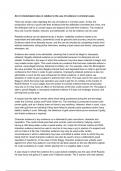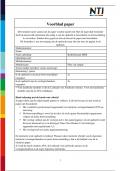AC 2.3 Understand rules in relation to the use of evidence in criminal cases
There are certain rules regarding the use of evidence in criminal cases. At trial, the
prosecution will try to prove with their evidence that the defendant committed the crime, and
the defendant will try to counter argue and disprove this with their evidence. The evidence
they use must be reliable, relevant, and admissible, so not all evidence can be used.
Reliable evidence can be determined by 3 factors: credibility (evidence needs to be
reasonable and believable), authenticity (must be genuine) and accuracy (must be correct).
Evidence needs to be factually secure, and this can be checked by completing checks from
witness testimonies, doing police interviews, looking at past cases and trends, using expert
witnesses, etc.
Evidence also needs to be admissible, meaning that it cannot be illegal or improperly
obtained. Illegally obtained evidence is not admissible because it is dishonest and not
reliable. Furthemore, the ways in which this evidence may have been collected is illegal, and
may violate human rights. This could include any evidence that has been collected without a
warrant, using illegal torturing, blackmail or bribery, etc. For example, when the Birmingham
Six were arrested, the police illegally tortured them and degraded them in order to get forced
confessions from them in order to gain evidence. Improperly obtained evidence is also not
admissible in court as this uses entrapment to obtain evidence, in which police use
deception in order to get a suspect to admit to their crime. This was used in the case of Colin
Stagg in which the honey trap operation was used to get him to confess to the murder of
Rachel Nickell. In court, judges have the power to exclude evidence that the prosecution
may rely on if it may have an effect on the fairness of the trial, under section 78. The judge is
able to permit illegally or improperly obtained evidence if it does not endanger anyone, and
will help find out the truth.
A suspect has the right to remain silent when being questioned during the pre-trial stage
under the Criminal Justice and Public Order Act. The individual is presumed innocent until
proven guilty, and so in theory does not have to say anything. However, when in court, a jury
may infer guilt from an individual if they have failed to answer police questions and/or have
failed to testify in court. Although, the inference of guilt cannot alone prove someone if guilty,
and further evidence is required.
Character evidence is any evidence on a defendant's past convictions, character and
reputation. This could include past bad work records, past convictions, bullying, racism,
having a child being taken under a social worker, etc. Under the Criminal Justice Act 2003,
character evidence cannot be used in court as it may sway a jury’s opinion of a suspect and
will not make it a fair trial. Character evidence may only be used under certain
circumstances in which a defendant may have committed a similar crime to which they are
being tried for. Good character evidence can also be used to prove a defendant's good
reputation if needed to. In the case of Colin Stagg, character evidence was unfairly used
against him when they stated in court that he had been placed on the sex offenders register
for nude sunbathing in a park, further placing him in a negative light in court.
A case study in which the evidence for a case lacked credibility was the case of Mr Roache.
He was found not guilty of 2 rapes and 4 indecent assults. The 5 women who had claimed






